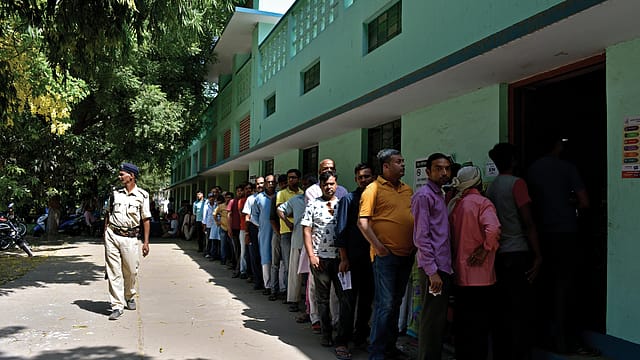The rise of a new civic voter in India
ADVERTISEMENT

The debate on whether to cut or keep trees in a park in India’s financial capital Mumbai was a sign. Until now, environmentalism, especially debates on tree-cutting, had been confined to the sepia-tainted photos of the Chipko Movement when villagers clung to trees to prevent them from being cut in the hills of Uttarakhand in the 1970s.
But the demand for a metro rail in a Mumbai bursting at its seams also had a lot of support from its citizens. The much-flaunted suburban rail network just cannot take the pressure of carrying many, many times its capacity anymore.
No matter where one stands in this argument, it is the underlying trend of citizen behaviour that is worth noting with care. The trend is one of transition, I would like to argue, from one kind of citizen behaviour to the other.
In the last few years, the interest of the Indian citizen moved from an external validation-facing, ‘globalising’ instinct to the rediscovery of a certain sense of nationalism and a turn of the gaze inwards to rediscover what made their country, and in turn, themselves, unique.
January 2026
Netflix, which has been in India for a decade, has successfully struck a balance between high-class premium content and pricing that attracts a range of customers. Find out how the U.S. streaming giant evolved in India, plus an exclusive interview with CEO Ted Sarandos. Also read about the Best Investments for 2026, and how rising growth and easing inflation will come in handy for finance minister Nirmala Sitharaman as she prepares Budget 2026.
Having achieved that sense of ‘pride’ if you will, the citizen is starting to ask deeper and more searching questions about the nature of that pride. To understand this, let us, for a moment, consider India’s history for the last three decades.
What has been the defining feature of the Indian voter in the last thirty years? It has been, I would argue, learning to dream without boundaries.
The most resolute trait of pre-liberalisation India, or Indian before 1991, was that everyone, in a sense, had to ‘know their place’. Some things were meant for ‘us’ (‘us’ could vary from where one was in the social pecking order) and some things just weren’t. Everyone knew the boundaries to their dreaming. There was no doubt some breakthrough success stories, often in sport or cinema, but these were aberrations.
Liberalisation messed up the status quo in our heads and made us disobedient dreamers. The ‘rise of India’ was really the unshackling of the ability to dream for a vast majority of people.
The fall of the country’s old elite is a story-in-progress. From culture to business, many members of the old guard are on the run. In the process, Indians have also been trying to answer the question – what kind of an Indian do we want to be? One answer is that we wish to be proud. We wish to be patriotic. The aspiration of ‘rising India’ and that of our individual selves has been blurred.
Some of this assertion of patriotism is correlated to the expansion of economic well-being. In 1959, in a famous exposition, the American sociologist Seymour Lipset argued that democracy and economic well-being were interconnected—the richer the country, the more the support for democracy within it. This is known as the Lipset hypothesis.
Over the years, the straight-line conclusions of this hypothesis have been challenged. A 2011 paper by Enrique Moral-Benito and Cristian Bartolucci found a ‘non-linear’ effect and suggested that “while a positive effect emerges for poor countries, this effect vanishes for rich countries”.
India is at critical juncture of its journey. It is wealthier than ever in its 70-year history as a modern nation-state but the distribution of that wealth has been uneven, at best. After two decades of globalisation, it has asked, as postcolonial countries often do, who exactly has the right to represent the nation and in what way? Whose, and which, cultural values matter? Whose, and which, economic models are desired?
These are questions intrinsically associated with nationalism, and these have been asked and answered with much debate in the last half a decade. But the needle is turning again. Having discovered that need for pride, the citizen is starting to ask—how does this pride translate into my immediate life and surroundings?
This translation is about receiving what I like to call goods of governance – it could be a toilet, a bank account, an electricity connection, piped water or even a metro rail. Each delivery boosts this civic sense of well-being that lies at the base of any sense of pride.
This is particularly relevant because India is becoming (it would not be too wrong to suggest has become) a country driven by mega cities. In 2018, an Oxford Economics research report showed that India has all of the top 10 fastest growing cities in the world. Many of these cities are already at breakpoint in terms of their capacity to handle extremely large populations and would require significant governance reform and massive infrastructure spend to become future ready.
The emergence of the civic-minded citizen or voter will become or indeed is becoming one of the most powerful voting blocs of the future. This transition is always subtle and less noisy than the debates that surround us. But the signs are clear for any sharp politician to spot.
National pride will not go away – in fact it will take the centre-stage as a catalyst to spur on the citizen but the definition of this pride, and its source, will become less esoteric and more definitive in real terms, within the local realm of the citizen.
The political parties that best understand and address this change would be the winners of the future.
Views are personal.
